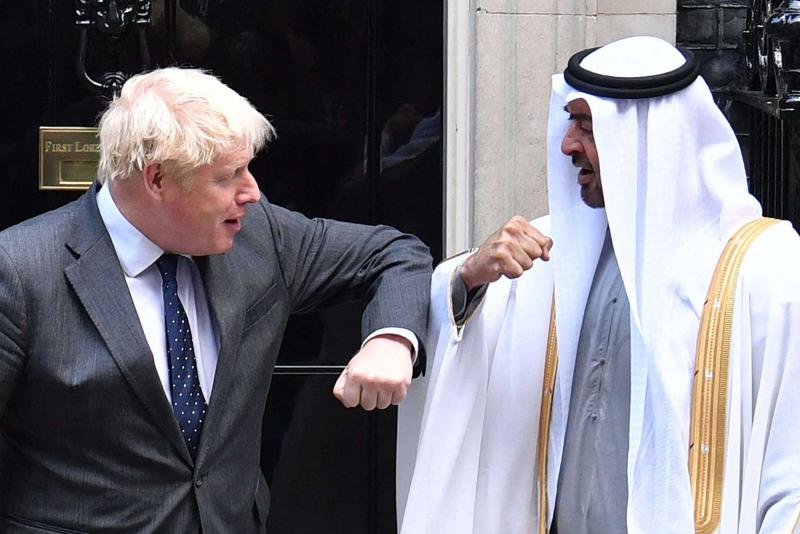The United Arab Emirates has been edging closer to Britain, in an attempt to create a regional and international front that could fill in the security and strategic vacuum left by the United States in the Arab Gulf region.
Over the last few months, the administration of US President Joe Biden has made additional steps to shift its global focus away from the Middle East and more towards China.
On Thursday, Abu Dhabi Crown Prince Sheikh Mohammed bin Zayed al-Nahyan met UK Prime Minister Boris Johnson, the official WAM news agency reported.
The pair inspected a British Army honour guard as the energy-rich UAE builds up to the December celebration of its founding in 1971, after Britain had relinquished control over its constituent emirates.
The Emirati state news agency WAM said Sheikh Mohammed discussed with Johnson the historic friendship ties and joint strategic cooperation between the UAE and the UK and ways to enhance relations in the best interest of the two sides.
“One of the most important aspects of our developmental projects for the next 50 years is promoting developmental partnerships with various countries of the world, especially with the UK,” the Abu Dhabi crown prince said in a statement released by WAM.
Sheikh Mohamed added that the UAE is on the cusp of hosting a major global event, Expo 2020 Dubai, adding, “We are confident that Britain’s participation will pave the way for more opportunities for economic and development partnership between our two countries. In the UAE, we seek to make this event a turning point on the road to promoting global economic recovery, establishing global partnerships and finding common ground to confront global challenges.”
Sheikh Mohammed’s meeting with Johnson came a day after a meeting with French President Emmanuel Macron in Paris.
A new security alliance, Aukus, formed by the United States, Britain and Australia has left France frustrated at being left out, prompting concerns over the impact on Washington’s commitment to form stronger ties with allies in confronting China.
Paris, however, seems to agree with London on the need to preserve security in the Arab Gulf region in cooperation with reliable allies who want to counter Iranian threats, including the danger posed by missile proliferation and the use of drones by Iran-backed proxies and militias.
The UAE, as a balanced political and military force, represents an axis for rallying allies in a region which is increasingly threatened by the expansion of Iranian influence and the activities of extremists groups.
These threats, experts say, were exacerbated by the withdrawal of the United States, which allowed for radical movements and armed groups to expand and get the upper hand in some regions, including in Afghanistan where the Taliban have regained control.
Saudi Arabia, which has been increasingly at odds with the US, is a natural member of the expanding alliance, in view of its geographic depth, military capabilities and regional influence.
In late January Biden ordered a review of all arms contracts concluded by his predecessor Donald Trump with Saudi Arabia and other countries.
In recent weeks, the US has removed its most advanced missile defence system and Patriot batteries from Saudi Arabia, even as the kingdom faced continued air attacks from Iran-backed Houthi militias in Yemen.
Then last week, US Defence Minister Lloyd Austin cancelled a planned visit to Saudi Arabia, having been unable to meet the crown prince, who is also the Saudi defence minister.
The emerging alliance, experts say, will benefit from the end of a dispute with Qatar, following the Al-Ula summit agreement that was reached last January.
The rapprochement with Turkey, the experts added, is another factor that will be in the advantage of the alliance.
Following the meeting on Thursday at 10 Downing Street in central London, Abu Dhabi’s Mubadala sovereign wealth fund said the UAE will invest billions of dollars across the UK’s technology, infrastructure and energy transition sectors.
The United Arab Emirates has committed to £10 billion ($13.8 billion) over five years, according to a statement.
Mubadala said that its investment plans would “drive a significant increase” across the three target sectors, building on an existing life sciences deal.
In March, it said it had committed an initial £800 million ($1.1 billion) to UK life sciences over five years.
“Today’s expansion of our Sovereign Investment Partnership will help accelerate funding and innovation in key sectors that are foundational to economic growth of both nations,” said Mubadala chief executive Khaldoon Al Mubarak.
The fund’s statement cited the UK minister for investment, Gerry Grimstone, as saying that the move would “expand the exchange of knowledge, skills and ideas that will drive prosperity in both nations.”
The new investment is a boost to the Johnson government’s vows to boost trade with the rest of the world, including the Middle East, after Britain left the European Union fully in January.
“This partnership has gone from strength to strength and its expansion is evidence of its effectiveness and what we can achieve with important trade and investment partners like the UAE through investment,” Minister for Investment Gerry Grimstone said.
UK-UAE trade was worth £18.6 billion in 2019 and two-way investment came to £13.4 billion, according to British government data.
“Today’s expansion of our Sovereign Investment Partnership will help accelerate funding and innovation in key sectors that are foundational to economic growth of both nations,” said Mubadala chief executive Khaldoon Al Mubarak.
In the run-up to Britain hosting the COP26 summit in November, the new partnership envisages energy giant BP collaborating with the Abu Dhabi National Oil Company and renewables firm Masdar on climate-focused investments.
Those potentially include “low-carbon hydrogen hubs” and the creation of a carbon-neutral air corridor between the two countries, the statement said.
The partnership also encompasses the reinforcement of already strong military ties between Britain and the UAE, whose relations with Gulf neighbour Iran are tense.
Britain said it planned to increase land exercises in the UAE.
In a joint communiqué on Sheikh Mohammed’s visit to London, the two countries “reiterated their commitment to deepening their strategic partnership on foreign policy, regional, security and defence issues and they announced the launch of the strategic Dialogue that will drive forward collaboration in education, culture and climate change, multilateral cooperation and security issues.”
“Both leaders agreed on increased cooperation to ensure the safety and security of maritime commerce, trade and energy routes,” the communiqué added.
Source: Arab Weekly
***Show us some LOVE by sharing it!***



